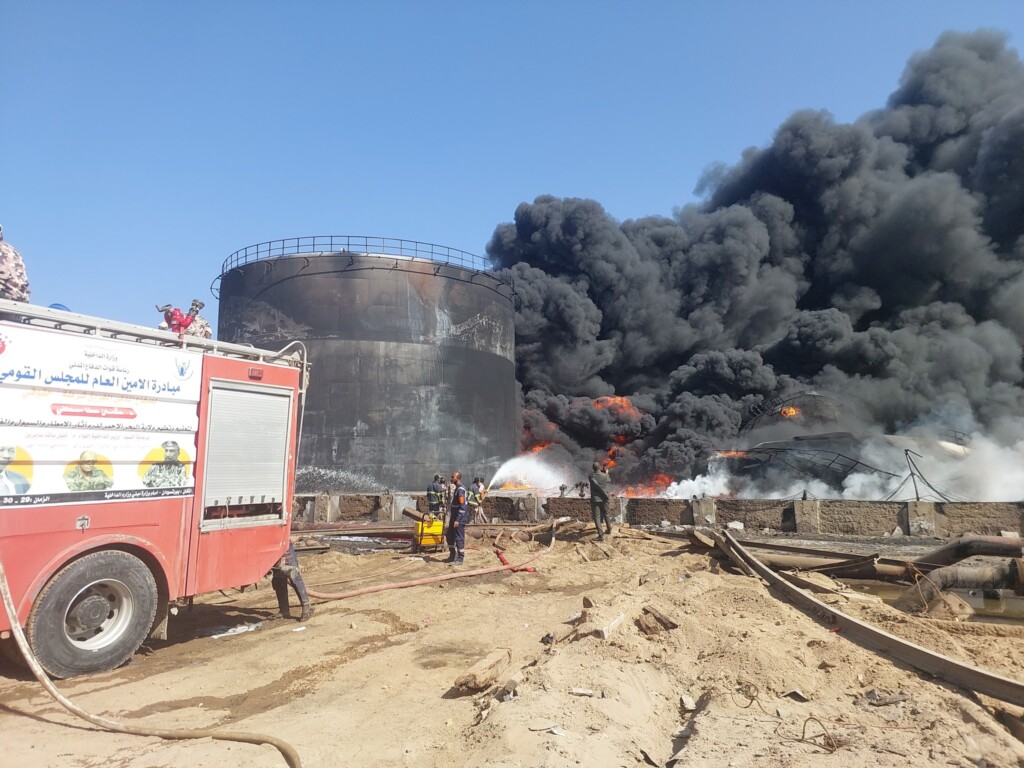Fuel crisis and civilian fears mount as drones continue to strike eastern Sudan

Flames engulf a strategic fuel warehouse in Port Sudan following an alleged drone strike by the paramilitary Rapid Support Forces, May 6 2025 (Photo: Ministry of Energy via Facebook)
Drone strikes hit the eastern Sudanese cities of Port Sudan and Kassala on Wednesday, with renewed attacks fuelling concern over a worsening crisis in one of the country’s few remaining safe areas. The renewed attacks, which began at dawn and resumed in the evening, targeted the naval base in Port Sudan, capital of the Red Seas state.
Eyewitnesses told Radio Dabanga that ten drones struck at dawn yesterday, igniting fires near military installations. Similar strikes were reported later in the day. In total, local air defences reportedly downed at least eight drones, four in Port Sudan and four in Kassala, according to security sources.
Residents in Suakin, south of Port Sudan, confirmed that drones also hit the port of Osman Digna Air Base, causing what they described as “limited damage.”
The attacks, which mark the fourth consecutive day of drone strikes, prompted the temporary suspension of air and sea traffic in Port Sudan. The United Nations halted humanitarian aid flights to and from the city in response.
The Sudanese Armed Forces (SAF) have accused the paramilitary Rapid Support Forces (RSF) of carrying out a coordinated drone campaign targeting the strategic Red Sea city of Port Sudan since Sunday.
Following RSF’s takeover of Khartoum early in the conflict, the city became the base for the de facto Sudan government.
Fuel depots
Strategic fuel depots in Port Sudan continued to burn for a second day. Plumes of smoke rose over the city, although sources told Radio Dabanga that the flames had not spread to the fifth warehouse and that smoke was now less visible from afar. Sources indicate the impact has already triggered a severe fuel crisis.
The black market price of petrol surged to SDG 70,000 per gallon. Long queues of vehicles formed outside fuel stations, and residents reported a near total collapse of public transport within the city.
A similar fuel shortage has hit Kassala and River Nile states, where people report waiting hours in front of petrol stations.
The Ministry of Energy sought to calm fears, claiming fuel supplies remained stable and available.
Former Undersecretary of Energy, Suleiman Hamed, warned of long-term consequences. He told Radio Dabanga that the depot struck in Monday’s attack was one of just two strategic fuel warehouses in Port Sudan, each with a 220,000-ton capacity.
“The fire extended to four sub warehouses,” he said, warning of a lasting impact on Sudan’s petroleum availability.
“The cost of constructing the damaged facility was 150 million dollars,” he added, noting that full assessments of the damage were still underway. Hamed also expressed concern that fuel scarcity could drive widespread deforestation as people resort to firewood.
The Sudan Doctors Network reported that 17 people had been injured in the recent strikes, including nine cases of suffocation due to toxic fumes from burning fuel. Hospitals across Port Sudan have been placed on emergency footing.
The network urged authorities to issue a public health alert and warned residents to avoid inhaling smoke from the fires, citing risks to those living near the blaze.
In Port Sudan, the humanitarian situation is deteriorating. Power outages, high food prices, and a lack of clean drinking water are impacting residents in the city.
A source on the ground told Radio Dabanga, “Merchants are exploiting the crisis, and government oversight is weak.”
Some residents returned home after authorities managed to contain the fires, though many reported lootings during the chaos.
The Red Sea State Police said suspects had been arrested and charged under Article 77 of the Criminal Code.
In response to the mounting crisis, the Red Sea State Security Committee issued emergency measures banning cafes, mobile vendors, and freelance tradespeople from operating in sensitive areas.
“These are potential hotspots for gatherings that could jeopardise public security,” the Committee said in a statement, pledging strict enforcement in coordination with other authorities.
The Committee added that the restrictions were temporary and intended to “contain the current situation and strengthen security in the Red Sea.” It urged citizens to cooperate with security forces to ensure stability.
In a separate development, the Ministry of Information restricted live broadcasts from satellite channels, requiring prior permission. Journalists reported interference with coverage of events in Port Sudan.
European Union
Reacting to the strikes, the European Union issued a statement on Wednesday, denouncing what it said were drone attacks carried out by the RSF.
“These attacks, which targeted critical infrastructure including civilian facilities, mark a significant and troubling expansion of the conflict,” the statement said. It noted that Port Sudan had become a refuge for thousands fleeing combat in other regions.
The EU “unequivocally condemns the RSF’s use of drone strikes against civilian and key targets,” warning that such actions “undermine regional stability and violate international humanitarian law.”
“These actions, supported by international backers, threaten the safety and wellbeing of Sudanese civilians and international staff residing in Port Sudan,” the statement continued.
The EU called on all parties to end hostilities and engage in dialogue, urging those supplying weapons to the belligerents to “cease their support immediately.”
The bloc reaffirmed its commitment to “supporting efforts aimed at restoring peace and stability in Sudan.”








 and then
and then